外研版(2019)必修第二册Unit 6 Earth first Using language课件(共55张,内嵌音频)
文档属性
| 名称 | 外研版(2019)必修第二册Unit 6 Earth first Using language课件(共55张,内嵌音频) | 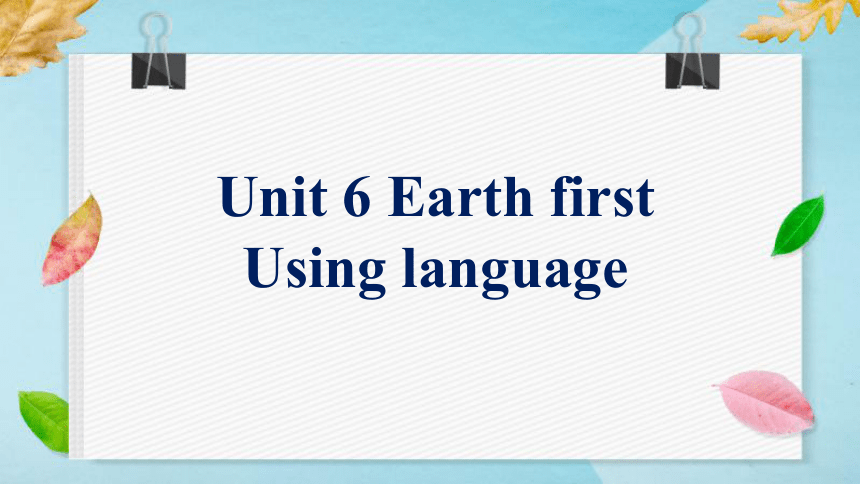 | |
| 格式 | pptx | ||
| 文件大小 | 58.0MB | ||
| 资源类型 | 教案 | ||
| 版本资源 | 外研版(2019) | ||
| 科目 | 英语 | ||
| 更新时间 | 2024-11-24 15:06:51 | ||
图片预览

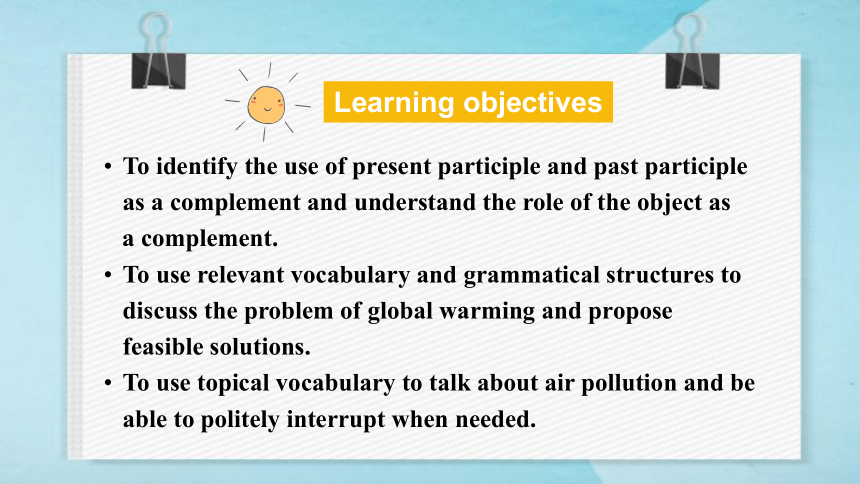
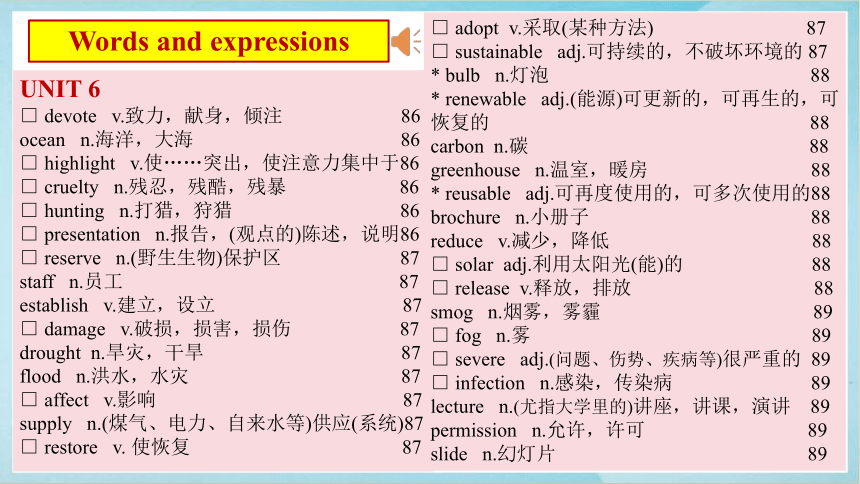
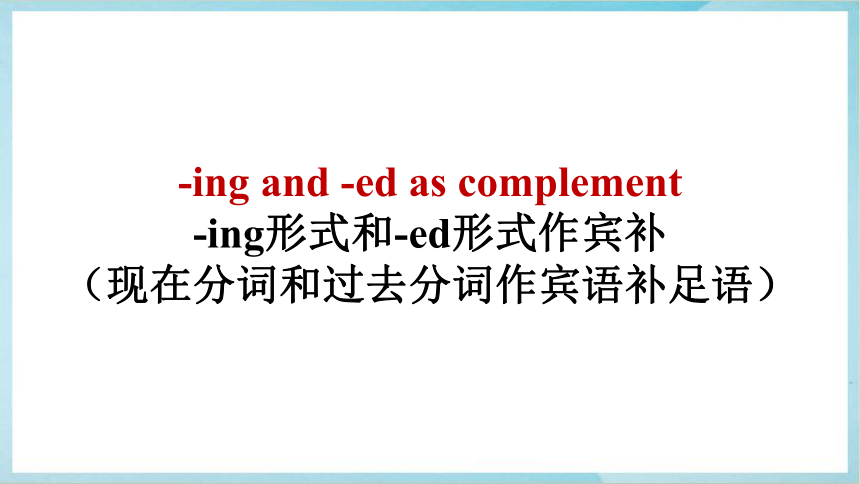
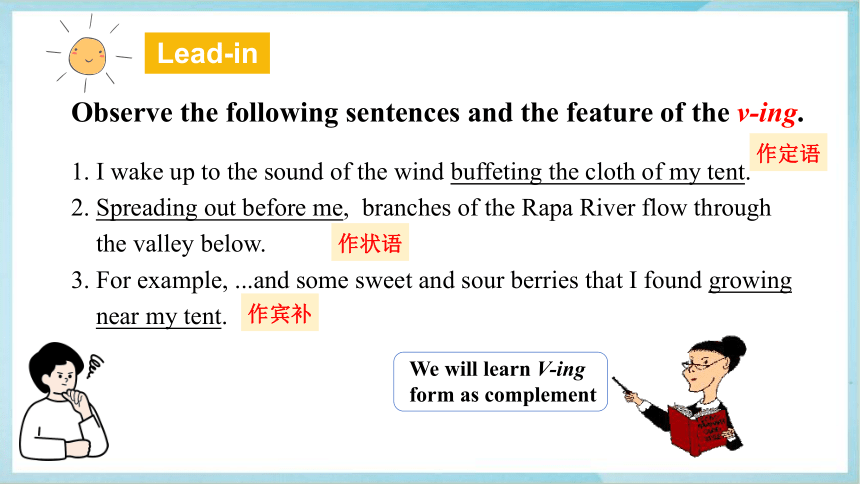
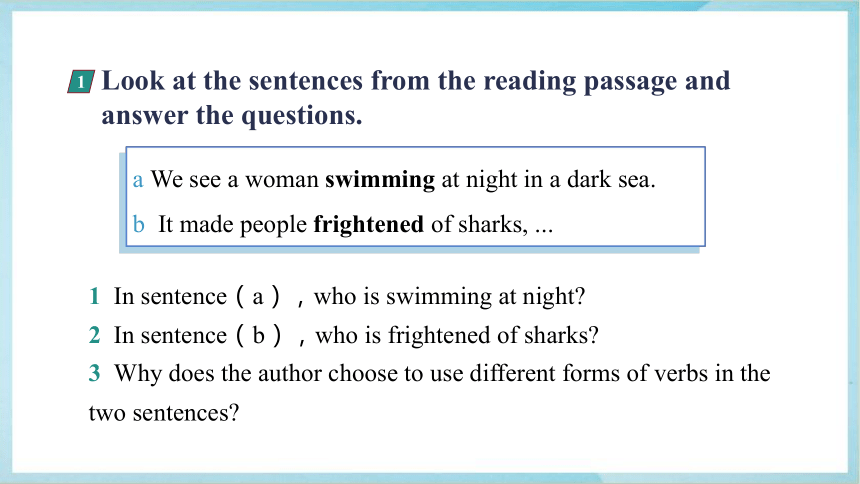
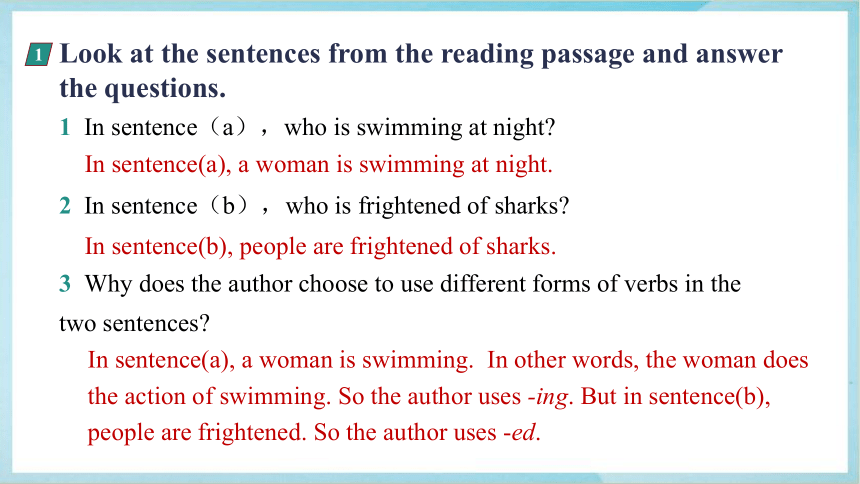

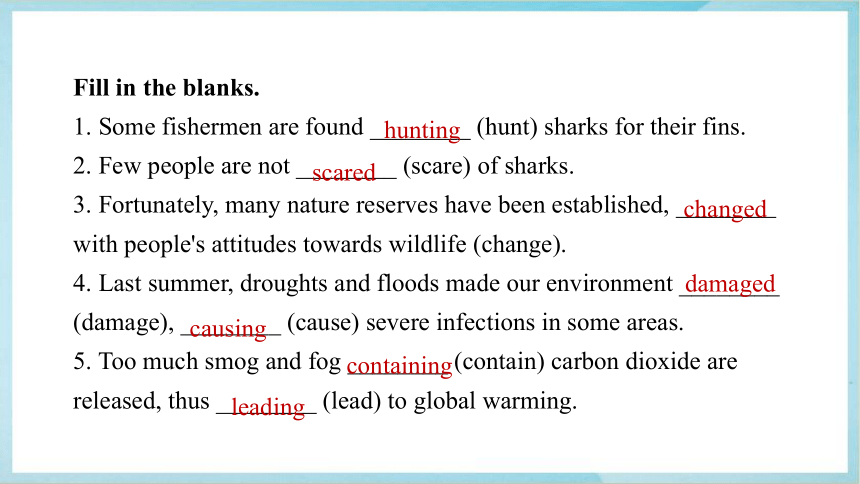
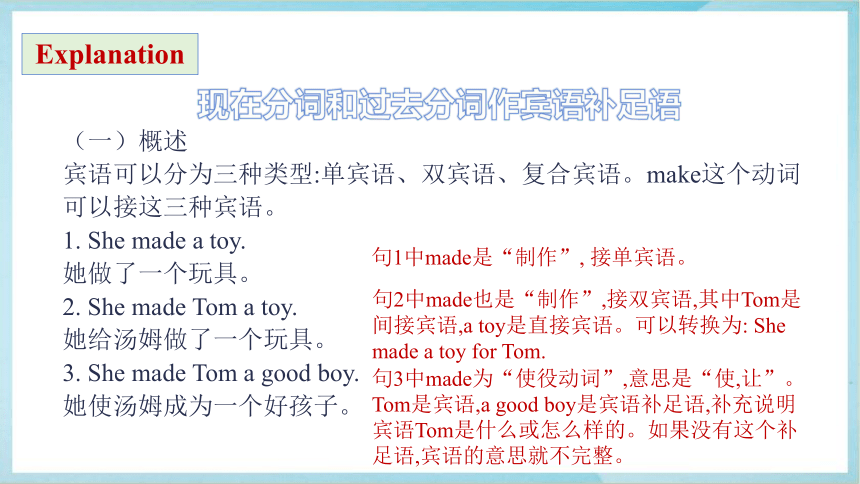
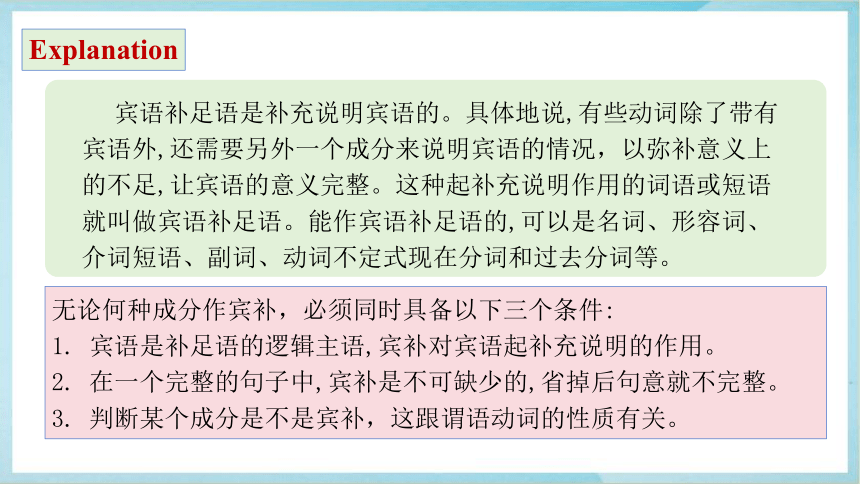
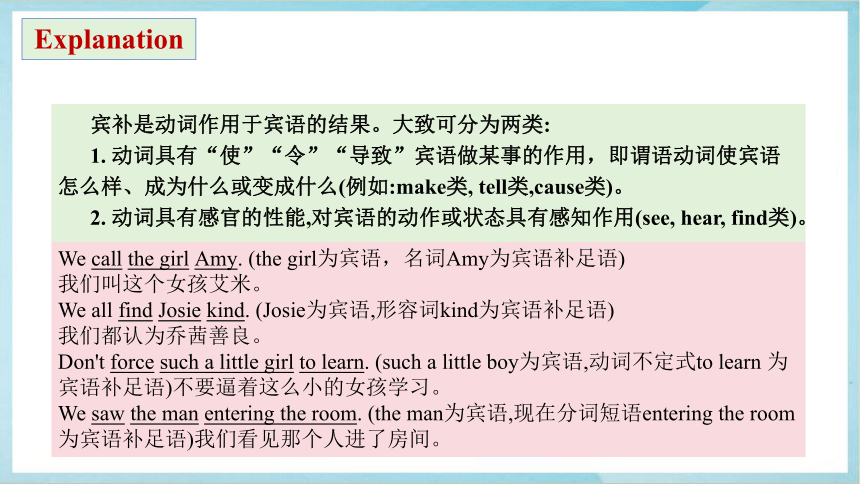
文档简介
(共55张PPT)
Unit 6 Earth first
Using language
To identify the use of present participle and past participle as a complement and understand the role of the object as
a complement.
To use relevant vocabulary and grammatical structures to discuss the problem of global warming and propose feasible solutions.
To use topical vocabulary to talk about air pollution and be able to politely interrupt when needed.
Learning objectives
Words and expressions
UNIT 6
□ devote v.致力,献身,倾注 86
ocean n.海洋,大海 86
□ highlight v.使……突出,使注意力集中于86
□ cruelty n.残忍,残酷,残暴 86
□ hunting n.打猎,狩猎 86
□ presentation n.报告,(观点的)陈述,说明86
□ reserve n.(野生生物)保护区 87
staff n.员工 87
establish v.建立,设立 87
□ damage v.破损,损害,损伤 87
drought n.旱灾,干旱 87
flood n.洪水,水灾 87
□ affect v.影响 87
supply n.(煤气、电力、自来水等)供应(系统)87
□ restore v. 使恢复 87
□ adopt v.采取(某种方法) 87
□ sustainable adj.可持续的,不破坏环境的 87
* bulb n.灯泡 88
* renewable adj.(能源)可更新的,可再生的,可恢复的 88
carbon n.碳 88
greenhouse n.温室,暖房 88
* reusable adj.可再度使用的,可多次使用的88
brochure n.小册子 88
reduce v.减少,降低 88
□ solar adj.利用太阳光(能)的 88
□ release v.释放,排放 88
smog n.烟雾,雾霾 89
□ fog n.雾 89
□ severe adj.(问题、伤势、疾病等)很严重的 89
□ infection n.感染,传染病 89
lecture n.(尤指大学里的)讲座,讲课,演讲 89
permission n.允许,许可 89
slide n.幻灯片 89
-ing and -ed as complement
-ing形式和-ed形式作宾补
(现在分词和过去分词作宾语补足语)
Observe the following sentences and the feature of the v-ing.
1. I wake up to the sound of the wind buffeting the cloth of my tent.
2. Spreading out before me, branches of the Rapa River flow through
the valley below.
3. For example, ...and some sweet and sour berries that I found growing
near my tent.
作定语
作状语
作宾补
We will learn V-ing form as complement
Lead-in
Look at the sentences from the reading passage and answer the questions.
1
a We see a woman swimming at night in a dark sea.
b It made people frightened of sharks, ...
1 In sentence(a),who is swimming at night
2 In sentence(b),who is frightened of sharks
3 Why does the author choose to use different forms of verbs in the two sentences
1 In sentence(a),who is swimming at night
2 In sentence(b),who is frightened of sharks
3 Why does the author choose to use different forms of verbs in the
two sentences
In sentence(a), a woman is swimming at night.
In sentence(b), people are frightened of sharks.
In sentence(a), a woman is swimming. In other words, the woman does the action of swimming. So the author uses -ing. But in sentence(b), people are frightened. So the author uses -ed.
Look at the sentences from the reading passage and answer
the questions.
1
Now look for more sentences with these structures in the reading passage.
People just wanted them killed.(want+宾语+v.-ed作宾补)
Benchley saw sharks being killed and this caused a deep change in him.(see+宾语+v.-ing的被动形式作宾补)
-ing and -ed as complement
Look at the sentences from the reading passage and answer
the questions.
1
Fill in the blanks.
1. Some fishermen are found ________ (hunt) sharks for their fins.
2. Few people are not ________ (scare) of sharks.
3. Fortunately, many nature reserves have been established, ________ with people's attitudes towards wildlife (change).
4. Last summer, droughts and floods made our environment ________ (damage), ________ (cause) severe infections in some areas.
5. Too much smog and fog ________ (contain) carbon dioxide are released, thus ________ (lead) to global warming.
hunting
scared
changed
damaged
causing
containing
leading
现在分词和过去分词作宾语补足语
(一)概述
宾语可以分为三种类型:单宾语、双宾语、复合宾语。make这个动词可以接这三种宾语。
1. She made a toy.
她做了一个玩具。
2. She made Tom a toy.
她给汤姆做了一个玩具。
3. She made Tom a good boy.
她使汤姆成为一个好孩子。
句1中made是“制作”, 接单宾语。
句2中made也是“制作”,接双宾语,其中Tom是间接宾语,a toy是直接宾语。可以转换为: She made a toy for Tom.
句3中made为“使役动词”,意思是“使,让”。Tom是宾语,a good boy是宾语补足语,补充说明宾语Tom是什么或怎么样的。如果没有这个补足语,宾语的意思就不完整。
Explanation
宾语补足语是补充说明宾语的。具体地说,有些动词除了带有宾语外,还需要另外一个成分来说明宾语的情况,以弥补意义上的不足,让宾语的意义完整。这种起补充说明作用的词语或短语就叫做宾语补足语。能作宾语补足语的,可以是名词、形容词、介词短语、副词、动词不定式现在分词和过去分词等。
无论何种成分作宾补,必须同时具备以下三个条件:
1. 宾语是补足语的逻辑主语,宾补对宾语起补充说明的作用。
2. 在一个完整的句子中,宾补是不可缺少的,省掉后句意就不完整。
3. 判断某个成分是不是宾补,这跟谓语动词的性质有关。
Explanation
宾补是动词作用于宾语的结果。大致可分为两类:
1. 动词具有“使”“令”“导致”宾语做某事的作用,即谓语动词使宾语怎么样、成为什么或变成什么(例如:make类, tell类,cause类)。
2. 动词具有感官的性能,对宾语的动作或状态具有感知作用(see, hear, find类)。
We call the girl Amy. (the girl为宾语,名词Amy为宾语补足语)
我们叫这个女孩艾米。
We all find Josie kind. (Josie为宾语,形容词kind为宾语补足语)
我们都认为乔茜善良。
Don't force such a little girl to learn. (such a little boy为宾语,动词不定式to learn 为宾语补足语)不要逼着这么小的女孩学习。
We saw the man entering the room. (the man为宾语,现在分词短语entering the room为宾语补足语)我们看见那个人进了房间。
Explanation
She tried to make herself understood. (herself为宾语,过去分词understood为宾语补足语)
她设法让别人理解她的意思。
When she woke up, she found herself in the hospital. (herself为宾语,介词短语in the hospital为宾语补足语)
她醒来时发现自己在医院里。
When we arrived at his house, we found Mr. Smith out. (Mr. Smith为宾语副词out 为宾语补足语)
当我们到达他家时,我们发现史密斯先生外出了。
Explanation
友情提示:
句子由主动语态变成被动语态后,宾语补足语变成主语补足语。
She was last seen playing near the river.
有人最后一次看见她在河附近玩。
Tom was considered to have stolen the money
人们认为汤姆偷了那笔钱。
The door was pushed open.
门被推开了。
She was caught cheating in the exam.
他被抓住考试作弊。
John was made the monitor.
约翰被选为班长。
Explanation
(二)现在分词作宾语补足语
现在分词除了作状语、定语和表语外,还可以作宾语补足语,说明宾语怎么样或正在进行的动作。现在分词作宾语补足语分为两种情况:一种是形容词性质的现在分词作宾语补足语;一种是动作性质的现在分词作宾语补足语。
1.形容词性质的现在分词作宾补
表示“观点”的这一类动词如think, consider, believe, find, feel等,都可以接这类复合宾语。
We think the report very encouraging.
我们认为这个报告非常鼓舞人。
I considered the book rather boring.
我认为这本书相当枯燥。
They all feel the result of the game disappointing.他们都觉得比赛结果令人失望。
We all found the child very annoying.
我们都觉得这个孩子很烦人。
Explanation
2.动作性质的现在分词作宾补
(1)感官动词see, hear, feel, smell, watch, notice, observe, discover, find, listen to, look at, catch (当场发现)等,可以接复合宾语,现在分词作宾补。
友情提示:
①感官动词后面可跟现在分词作宾补,也可跟不带to的不定式作宾补(find和 catch除外),二者有一定的差别。现在分词表示正在进行的动作,不定式表示动作的全过程或结果。
Someone saw Jack watering flowers in the garden.
有人看见杰克在花园里浇花。
She heard someone singing next door.
她听到隔壁有人在唱歌。
I noticed something burning.
我注意到有东西燃了起来。
I heard the door bell ringing.
我听见门铃在响。(听的时候门铃正在响)
I heard someone knock at the door.
我听见有人敲门了。(听见敲门的全过程)
②现在分词作感官动词的宾补时,不能使用完成式。
He saw the house having burned. (误)
He saw the house burning. (正)
Explanation
(2) 使役动词have, get, set, leave, keep等,可以接复合宾语,现在分词作宾补。
3. 在“with + 宾语 + 现在分词”结构中,现在分词充当了with的宾语的补足语。
I can't have you wasting water like that.
我不能让你那样浪费水。
Don't keep your children learning all day.
不要让你的孩子整天都在学习。
It was cold, so they left the fire burning all the night.
天气很冷,所以他们让炉火整夜燃烧着。
Mary felt very shy with so many eyes looking at her.
有这么多眼睛看着她,玛丽感到很害羞。
With prices going up so fast, we can't afford luxuries.
物价上涨这么快,我们买不起奢侈品。
Explanation
(三)过去分词作宾语补足语
过去分词除了作状语、定语和表语外,还可以作宾语补足语。宾语与过去分词存在被动关系,即宾语是过去分词动作的承受者。能接过去分词作宾语补足语的动词主要有两大类:一类是感官动词,另一类是使役动词。
1. 感官动词see, hear, feel, notice, find等可以接复合宾语,过去分词作宾补。
While she was reading, she heard her name called behind.
当她在读书的时候,她听见有人在背后叫她的名字。
I find his English improved a lot.我发现他的英语提高很多。
2. 使役动词make, have, get, keep, leave等可以接复合宾语,过去分词作宾补。
She went to the hospital to have his eyes examined.她去医院把眼睛检查了一下。
The foreigner tried to make herself understood, but failed.
这个外国人设法使别人明白她的意思,但失败了。
Explanation
3. 意欲动词want, like, wish, expect, would like等可以接复合宾语,过去分词作宾补。
I'd like the job done when I come back from the journey.
当我旅行回来时,我想让这份工作(被别人)做完。
The mother wants her daughter taught music in her free time.
这位母亲想让她的女儿在空闲时间学音乐。
上述动词也可以接不定式的被动式作宾语补足语,即在过去分词前加to be。
They would like the book (to be) published this year.
他们想要这本书今年出版。
We want this matter (to be) settled immediately.
我们希望这个问题立刻被解决。
Explanation
(四)各种非谓语形式作宾补的区别
1.现在分词作宾补和过去分词作宾补的区别
现在分词作宾补,宾语是动作的执行者;过去分词作宾补,宾语是动作的承受者。
I saw the dog following a man.
我看见那只狗跟在一个人的身后。
I saw the dog followed by a man.
我看见有人在那只狗后面跟着。
2.不定式现在分词、过去分词作宾补的区别
不定式表示动作的全过程或结果;现在分词表示主动和正在进行;过去分词表示被动和完成。
I have seen Milla grow up from childhood, so I know her quite wel1.
我看着米拉从小长大,因此我很了解她。
Some students last saw Reed playing near an Internet bar.
几个学生最后看见瑞德时他正在一家网吧附近玩耍。
I'd like to see a proposal put forward at once.
我想看到立马有人提出建议。
Explanation
3.过去分词现在分词被动式作宾补的区别
She heard her name called just a moment ago.
刚才她听见有人叫过她的名字。 (called是过去分词作宾补,表示“被动和完成”)
She heard her name being called from behind and stopped to look back.
她听见有人在后面一直叫她的名字,就停下来向后看。(being called是现在分词的被动式作宾补,表示“被动和进行”)
Explanation
现在分词(v.-ing)或过去分词(v.-ed)
作宾语补足语
① see, hear, find, notice + sb./sth.+
doing
done
② have, keep, get, leave + sb./sth.+
doing
done
“使, 让”
③ with + sb./sth.+
doing
done
Explanation
用所给动词的正确形式完成句子
Last Sunday, we went to the zoo to see some wild animals. When we arrived in the early morning, we found the gate 1. ________ (close). So we had to wait outside. As soon as we saw the gate 2. ________ (open), we went in immediately. How excited we were to see some animals 3. ________ (play) with each other in the zoo!
There was a huge metal cage in the centre of the zoo. As we drew near, we could see a small monkey 4. ____________ (attack) by a group of older monkeys. While I was watching, I heard my name 5. ________ (call) from behind. I noticed a boy 6. ________ (name) David 7. ________ (run) towards me.
He told me that he had met a foreigner and the foreigner didn't speak Chinese. So he wasn't able to make himself 8. ________ (understand) though he tried to make some gestures. When I learned that the foreigner wanted to have a picture 9. ________ (take) by the side of a beautiful peafowl, I went and helped take a picture for him at once.
closed
opened
playing
being attacked
called
named
running
understood
taken
Explanation
单句语法填空
(1)When I was on my way to school this morning,I saw two women
________(argue).
(2) He was just about to sit down when he felt something (move)near his feet.
(3)On the bank of the river,we found him (lie)on a bench,with his eyes (fix)on a kite in the sky.
(4) I stood on the bridge and watched boats (pass)by.
arguing
moving
lying
passing
fixed
with his eyes __________ (look) at a kite in the sky
looking
fix eyes on…: 盯着……看
eyes为fix的宾语,相似短语如show sb. around
Explanation
(5) Don’t keep the children (work)on their lessons all day.
(6)The young man was caught (steal)a car.
(7) Listening to music at home is one thing,going to hear it _______________________(perform)live is quite another thing.
(8) A cook will be immediately fired if he is found (smoke)in the kitchen.
working
stealing
being performed
smoking
Explanation
(9) He is very popular among his students as he always tries to make them
(interest )in his lectures.
(10)When we saw the road (block)with snow,we decided to spend the holiday at home.
(11)Let’s have all the windows (clean).
(12)Before driving into the city,you are required to get your car ___________(wash).
interested
blocked
cleaned
washed
Explanation
(13) Even the best writers sometimes find themselves (lose)
for words.
(14) We expect this plan (carry) out successfully.
(15) This song is often heard (sing)everywhere in China.
(16) His parents saw him (award)the winner’s medal.
lost
carried
sung
awarded
Explanation
现在分词和过去分词
作宾语补足语(语法专练)
Exercises
Read the passage and choose the correct form of the verbs.
Attracted/Attracting by mermaids since she was a child, Hannah Fraser created her first tail when she was only nine years old. Now, she is a model and performance artist devoted/ devoting to ocean conservation. She can be seen worn/wearing mermaid clothing and dived/ diving up to 50 feet underwater to swim with dolphins, sharks and whales. She appeared in The Cove,a documentary aiming at highlighting the cruelty of dolphin hunting. Besides performing and modelling, Hannah travels the world given/giving presentations and talks, getting more people involved/involving in the conservation of ocean life.
2
Exercises
Rewrite the underlined sentences in the interview, using the -ing and -ed forms to make it more compact and coherent.
Reporter: Hello from Sanjiangyuan National Nature Reserve(SNNR). With me today is Lin Feng,a staff member working here. Lin Feng,can you tell us a bit about SNNR
Lin Feng:Well,SNNR was established in 2000 and is the highest and second largest nature reserve in China. Here, you can see dramatic landscapes. They change from mountains to grasslands, forests to rivers. Most importantly,it contains the headwaters of the Yellow River, the Changjiang River and the Lancang River.
3
Here, you can see dramatic landscapes changing from mountains to grasslands, forests to rivers.
Exercises
Reporter: What’s the biggest problem faced by SNNR
Lin Feng: In recent years, we have seen large areas of wetland that were damaged by human activity. This has had a negative impact on the unique plants and animals living there. We’ve also seen droughts and floods caused by these changes, which affect the water supply downstream. lt is an integrated system, you see.
Reporter: And what sort of work are you doing to help solve these problems
In recent years, we have seen large areas of wetland damaged by human activity.
Exercises
Lin Feng: Our job is to protect and restore the natural environment. This includes keeping the original environment from being touched, as well as adopting new, sustainable ways of feeding farm animals.
Reporter: Research shows that the environment and vegetation coverage in the wetlands have been greatly improved. You've done a great job!
This includes keeping the original environment untouched,
Exercises
Dealing with global warming
_________________________
Share what you know about these expressions.
4
节约用水
LED灯管
可再生资源
碳足迹
温室效应
再生水瓶
企业机构、活动、产品或个人通过交通运输、食品生产和消费以及各类生产过程等引起的温室气体排放的集合
Complete the brochure with the expressions in Activity 4.
Six things you can do NOW to help stop global warming
Reduce waste by choosing reusable products—get a(n) _________________ , for example.
Try to reduce your __________________. Walk or ride a bike instead of taking a car.
Use _______________ such as solar energy and wind power.
The less energy you use,the less carbon dioxide is released. Replacing a regular light bulb with a(n) ____________is a great start.
is important because clean water is a limited resource. Also, we use a lot of energy to process clean water.
Planting trees can help a lot in reducing the __________________ because trees absorb the carbon dioxide in the air.
reusable water bottle
carbon footprint
renewable energy
LED bulb
Water conservation
greenhouse effect
5
Work in pairs. Discuss what you can do to help deal with global warming, using the words and expressions you have learnt.
A: I will go to school by bike to reduce my carbon footprint.
B: I will ask for an electronic receipt when I go shopping.
…
6
A:I will choose reusable products—for example, get a reusable water
bottle to reduce waste.
B:I will walk or ride a bike instead of driving a car to reduce my
carbon footprint.
A:I will use renewable energy such as solar energy and wind power.
B:I will replace a regular light bulb with an LED bulb as a great start.
I will turn off the light when there is no person in the classroom.
I will unplug (拔掉插头) the TV when I don’t watch it.
I will turn off the tap when I finish washing my hands.
I will use the clothes-washing water to water the flowers.
What is the problem in the picture
smog
Smog comes from the words "smoke" and "fog", and it is used to describe the air pollution in cities caused mainly by traffic and factories. Smog can be dangerous because it causes severe breathing problems and infections.
n.雾
n.烟雾,雾霾
adj.(问题、伤势、传染病)很严重的
n.感染,传染病
Let’s watch a video and get some more information about smog.
Listen to the lecture and choose the topics that are covered.
1. What the word “smog” means.
2. When the word “smog” appeared.
3. What caused smog in the past.
4. What causes smog now.
5. The effects of smog on the environment.
6. How governments try to reduce smog.
7. What will happen if we don’t reduce smog.
7
礼貌的打断通常是请求允许打断某人,通常以If开头…我可以……吗?或者Can I…?在此之前可以先道歉,如Sorry,…或者Excuse me,…通常,当某人停下来喘口气时,或者在说出的句子之间的轻微停顿时,我们会打断他们。
Learning to learn
A polite interruption is usually framed as a request for permission to interrupt someone, often starting with If..., May I... or Can I... This may be preceded with an apology such as Sorry,... or Excuse me,... Usually we interrupt someone when they pause for breath, or during the slight pause between spoken clauses.
Listen again and complete the slides.
1900s
The Great Smog
no wind
chemicals
coming from traffic
requirements of paying to drive
chemicals
8
Now talk about what the students say to interrupt the lecturer politely. Listen again if necessary.
Lecturer: Good evening, everyone, and thank you for coming to today’s talk. I’m Dr Brown and I’m going to talk about air pollution in cities - what we all know as “smog”. Please feel free to stop me if you have any questions. So, first of all, a bit of history. The term “smog” was first used in the 1800s in cities that had problems with smoke and fog.
Student A: Sorry for interrupting, but I believe it was in the 1900s.
Lecturer: Sorry, I made a mistake. You are right. It was in the 1900s. Thank you. London was one of the cities where smog caused big problems. In December 1952, it suffered from “The Great Smog”. It was a very cold winter, so a lot of coal was burned at home and in the factories. The problem was that there was no wind, so thick smog covered the city. Nowadays...
Student B: Excuse me, but can I just ask - did the smog cause any deaths
Lecturer: I’m afraid so. According to research, about 4,000 people are known to have died as a result of the smog, but that number could be much higher. It was terrible! Nowadays, smog still exists, but is produced by chemicals coming from traffic and factories. However, governments are taking measures to reduce smog as much as possible. Now, let’s look at what smog does to our health.
Student A: If I could just stop you again... Can you give us examples of these measures
Lecturer: Well, for example, factories must follow rules about what chemicals they use. In some cities, when there’s smog, people have to pay to drive in the centre. Now, let’s move on to the impact of smog on our health...
Work in pairs and talk about recycling.
Student A
Tell Student B about recycling using the information below. Be prepared to be corrected by Student B.
The classification of household waste aims to help people separate different types of waste. This is important because these different types of waste can be disposed of or recycled appropriately and effectively.
Household waste can be roughly divided into:
* food waste
* non-recyclable waste
* recyclable waste, including paper, glass, plastic and used batteries
9
China plans to introduce household waste classification and sorting in the first batch of cities by 2020. Only Beijing, Shanghai, Tianjin and Chongqing are included in the first batch.
The target recycling rate in these cities has been set at 55% by 2020.
Useful expressions
Please feel free to stop me if you have any questions.
Sorry, I’ve made a mistake.
You’re right, ...
I’m afraid ...
Well, ...
Student B
Listen to Student A talking about recycling. Interrupt politely to correct him / her using the following information:
Used batteries are usually regarded as non-recyclable waste and should be disposed of separately.
The first batch of cities to introduce household waste classification and sorting includes Beijing, Shanghai, Tianjin, Chongqing and all capitals of provinces and autonomous regions.
The target recycling rate in these cities has been set at 35% by 2020.
Useful expressions
Sorry to interrupt, but...
Excuse me, but can I just ask...
Could I just stop you again to check...
Do you mind if I ask another question
Sorry, but I was wondering whether...
Is it OK if I jump in for a second
Lecturer: Good afternoon, everyone, and thank you for coming to today’s talk. I’m Dr Smith and I’m going to talk about recycling. Please feel free to stop me if you have any questions. So, first of all, the purpose of the classification of household waste. The classification of household waste aims to help people separate different types of waste. This is important because these different types of waste can be disposed of or recycled appropriately and effectively. And household waste can be roughly divided into: food waste; non-recyclable waste; recyclable waste, including paper, glass, plastic and used batteries.
Student B: Sorry for interrupting, but I know that used batteries are usually regarded as non-recyclable waste and should be disposed of separately.
Sample
Lecturer: Sorry, I’ve made a mistake. You are right. Used batteries are non-recyclable waste. Thank you. China plans to introduce household waste classification and sorting in the first batch of cities by 2020. Only Beijing, Shanghai, Tianjin and Chongqing are included in the first batch.
Student B: Could I just stop you again to check that you say only Beijing, Shanghai, Tianjin and Chongqing are included in the first batch As far as I know, not only cities Beijing, Shanghai, Tianjin and Chongqing, but all capitals of provinces and autonomous regions are included.
Lecturer: Sorry, I made a mistake again. Thanks for your correction. The target recycling rate in these cities has been set at 55% by 2020.
Student B: Is it OK if I jump in for a second In fact, The target recycling rate in these cities has been set at 35% by 2020.
Sample
Work in pairs. Talk about another environmental problem and have a similar conversation.
10
单句语法填空
1. Back from his two-year medical service in Africa, Dr. Lee was very happy to see his mother _______(take) good care of at home.
2. Alex was listening attentively to the lecture given by Professor Smith, with all his atention ______(fix) on it.
3. In the job interview, job applicants often find themselves _______(ask) unexpected questions, some very difficult to answer.
4. The girl answered the question in such a low voice that she couldn’t make herslef _______(hear) by others.
5. I am going to the hospital this afternoon and have my eyes ________(examine).
6. When I caught him ________(cheat) me, I stopped buying things there and started dealing with another shop.
taken
fixed
asked
heard
examined
cheating
Consolidation
单句语法填空
7. The old couple often take a walk after supper in the park with their pet dog ______________ (follow) them.
8. Listening to music at home is one thing, going to hear it _______________ (perform) live is quite another.
9. With the crop’s production __________(go) up rapidly, food price is going down year by year.
10. He had the light ________ (burn) all night, which made his parents
very angry.
11. The little boy was seen _______ (fall) from the horse when learning to
ride the horse.
12. I'd like the job ________ (do) when I come back from the journey.
following
being performed
going
burning
to fall
done
完成句子
1. 她必须大喊大叫才能让人听到她说话。
She had to shout _______________________.
2. 那么多人看着他,他感到很紧张。(with复合结构)
______________________________, he felt very nervous.
3. 她让我等我等了20多分钟。 (keep)
____________________ for over twenty minutes.
4. 我们必须在周五之前完成这项任务。(get sth...)
We must __________________by Friday.
5. 我发现她坐在火炉旁,看书。
I found her ________by the fire, ________________.
to make herslef heard
With so many people looking at him
She kept me waiting
get the work finished
sitting
reading a book
1. Do the exercises about the complement.
2. Write a passage talking about the problem of global warming.
Homework
Unit 6 Earth first
Using language
To identify the use of present participle and past participle as a complement and understand the role of the object as
a complement.
To use relevant vocabulary and grammatical structures to discuss the problem of global warming and propose feasible solutions.
To use topical vocabulary to talk about air pollution and be able to politely interrupt when needed.
Learning objectives
Words and expressions
UNIT 6
□ devote v.致力,献身,倾注 86
ocean n.海洋,大海 86
□ highlight v.使……突出,使注意力集中于86
□ cruelty n.残忍,残酷,残暴 86
□ hunting n.打猎,狩猎 86
□ presentation n.报告,(观点的)陈述,说明86
□ reserve n.(野生生物)保护区 87
staff n.员工 87
establish v.建立,设立 87
□ damage v.破损,损害,损伤 87
drought n.旱灾,干旱 87
flood n.洪水,水灾 87
□ affect v.影响 87
supply n.(煤气、电力、自来水等)供应(系统)87
□ restore v. 使恢复 87
□ adopt v.采取(某种方法) 87
□ sustainable adj.可持续的,不破坏环境的 87
* bulb n.灯泡 88
* renewable adj.(能源)可更新的,可再生的,可恢复的 88
carbon n.碳 88
greenhouse n.温室,暖房 88
* reusable adj.可再度使用的,可多次使用的88
brochure n.小册子 88
reduce v.减少,降低 88
□ solar adj.利用太阳光(能)的 88
□ release v.释放,排放 88
smog n.烟雾,雾霾 89
□ fog n.雾 89
□ severe adj.(问题、伤势、疾病等)很严重的 89
□ infection n.感染,传染病 89
lecture n.(尤指大学里的)讲座,讲课,演讲 89
permission n.允许,许可 89
slide n.幻灯片 89
-ing and -ed as complement
-ing形式和-ed形式作宾补
(现在分词和过去分词作宾语补足语)
Observe the following sentences and the feature of the v-ing.
1. I wake up to the sound of the wind buffeting the cloth of my tent.
2. Spreading out before me, branches of the Rapa River flow through
the valley below.
3. For example, ...and some sweet and sour berries that I found growing
near my tent.
作定语
作状语
作宾补
We will learn V-ing form as complement
Lead-in
Look at the sentences from the reading passage and answer the questions.
1
a We see a woman swimming at night in a dark sea.
b It made people frightened of sharks, ...
1 In sentence(a),who is swimming at night
2 In sentence(b),who is frightened of sharks
3 Why does the author choose to use different forms of verbs in the two sentences
1 In sentence(a),who is swimming at night
2 In sentence(b),who is frightened of sharks
3 Why does the author choose to use different forms of verbs in the
two sentences
In sentence(a), a woman is swimming at night.
In sentence(b), people are frightened of sharks.
In sentence(a), a woman is swimming. In other words, the woman does the action of swimming. So the author uses -ing. But in sentence(b), people are frightened. So the author uses -ed.
Look at the sentences from the reading passage and answer
the questions.
1
Now look for more sentences with these structures in the reading passage.
People just wanted them killed.(want+宾语+v.-ed作宾补)
Benchley saw sharks being killed and this caused a deep change in him.(see+宾语+v.-ing的被动形式作宾补)
-ing and -ed as complement
Look at the sentences from the reading passage and answer
the questions.
1
Fill in the blanks.
1. Some fishermen are found ________ (hunt) sharks for their fins.
2. Few people are not ________ (scare) of sharks.
3. Fortunately, many nature reserves have been established, ________ with people's attitudes towards wildlife (change).
4. Last summer, droughts and floods made our environment ________ (damage), ________ (cause) severe infections in some areas.
5. Too much smog and fog ________ (contain) carbon dioxide are released, thus ________ (lead) to global warming.
hunting
scared
changed
damaged
causing
containing
leading
现在分词和过去分词作宾语补足语
(一)概述
宾语可以分为三种类型:单宾语、双宾语、复合宾语。make这个动词可以接这三种宾语。
1. She made a toy.
她做了一个玩具。
2. She made Tom a toy.
她给汤姆做了一个玩具。
3. She made Tom a good boy.
她使汤姆成为一个好孩子。
句1中made是“制作”, 接单宾语。
句2中made也是“制作”,接双宾语,其中Tom是间接宾语,a toy是直接宾语。可以转换为: She made a toy for Tom.
句3中made为“使役动词”,意思是“使,让”。Tom是宾语,a good boy是宾语补足语,补充说明宾语Tom是什么或怎么样的。如果没有这个补足语,宾语的意思就不完整。
Explanation
宾语补足语是补充说明宾语的。具体地说,有些动词除了带有宾语外,还需要另外一个成分来说明宾语的情况,以弥补意义上的不足,让宾语的意义完整。这种起补充说明作用的词语或短语就叫做宾语补足语。能作宾语补足语的,可以是名词、形容词、介词短语、副词、动词不定式现在分词和过去分词等。
无论何种成分作宾补,必须同时具备以下三个条件:
1. 宾语是补足语的逻辑主语,宾补对宾语起补充说明的作用。
2. 在一个完整的句子中,宾补是不可缺少的,省掉后句意就不完整。
3. 判断某个成分是不是宾补,这跟谓语动词的性质有关。
Explanation
宾补是动词作用于宾语的结果。大致可分为两类:
1. 动词具有“使”“令”“导致”宾语做某事的作用,即谓语动词使宾语怎么样、成为什么或变成什么(例如:make类, tell类,cause类)。
2. 动词具有感官的性能,对宾语的动作或状态具有感知作用(see, hear, find类)。
We call the girl Amy. (the girl为宾语,名词Amy为宾语补足语)
我们叫这个女孩艾米。
We all find Josie kind. (Josie为宾语,形容词kind为宾语补足语)
我们都认为乔茜善良。
Don't force such a little girl to learn. (such a little boy为宾语,动词不定式to learn 为宾语补足语)不要逼着这么小的女孩学习。
We saw the man entering the room. (the man为宾语,现在分词短语entering the room为宾语补足语)我们看见那个人进了房间。
Explanation
She tried to make herself understood. (herself为宾语,过去分词understood为宾语补足语)
她设法让别人理解她的意思。
When she woke up, she found herself in the hospital. (herself为宾语,介词短语in the hospital为宾语补足语)
她醒来时发现自己在医院里。
When we arrived at his house, we found Mr. Smith out. (Mr. Smith为宾语副词out 为宾语补足语)
当我们到达他家时,我们发现史密斯先生外出了。
Explanation
友情提示:
句子由主动语态变成被动语态后,宾语补足语变成主语补足语。
She was last seen playing near the river.
有人最后一次看见她在河附近玩。
Tom was considered to have stolen the money
人们认为汤姆偷了那笔钱。
The door was pushed open.
门被推开了。
She was caught cheating in the exam.
他被抓住考试作弊。
John was made the monitor.
约翰被选为班长。
Explanation
(二)现在分词作宾语补足语
现在分词除了作状语、定语和表语外,还可以作宾语补足语,说明宾语怎么样或正在进行的动作。现在分词作宾语补足语分为两种情况:一种是形容词性质的现在分词作宾语补足语;一种是动作性质的现在分词作宾语补足语。
1.形容词性质的现在分词作宾补
表示“观点”的这一类动词如think, consider, believe, find, feel等,都可以接这类复合宾语。
We think the report very encouraging.
我们认为这个报告非常鼓舞人。
I considered the book rather boring.
我认为这本书相当枯燥。
They all feel the result of the game disappointing.他们都觉得比赛结果令人失望。
We all found the child very annoying.
我们都觉得这个孩子很烦人。
Explanation
2.动作性质的现在分词作宾补
(1)感官动词see, hear, feel, smell, watch, notice, observe, discover, find, listen to, look at, catch (当场发现)等,可以接复合宾语,现在分词作宾补。
友情提示:
①感官动词后面可跟现在分词作宾补,也可跟不带to的不定式作宾补(find和 catch除外),二者有一定的差别。现在分词表示正在进行的动作,不定式表示动作的全过程或结果。
Someone saw Jack watering flowers in the garden.
有人看见杰克在花园里浇花。
She heard someone singing next door.
她听到隔壁有人在唱歌。
I noticed something burning.
我注意到有东西燃了起来。
I heard the door bell ringing.
我听见门铃在响。(听的时候门铃正在响)
I heard someone knock at the door.
我听见有人敲门了。(听见敲门的全过程)
②现在分词作感官动词的宾补时,不能使用完成式。
He saw the house having burned. (误)
He saw the house burning. (正)
Explanation
(2) 使役动词have, get, set, leave, keep等,可以接复合宾语,现在分词作宾补。
3. 在“with + 宾语 + 现在分词”结构中,现在分词充当了with的宾语的补足语。
I can't have you wasting water like that.
我不能让你那样浪费水。
Don't keep your children learning all day.
不要让你的孩子整天都在学习。
It was cold, so they left the fire burning all the night.
天气很冷,所以他们让炉火整夜燃烧着。
Mary felt very shy with so many eyes looking at her.
有这么多眼睛看着她,玛丽感到很害羞。
With prices going up so fast, we can't afford luxuries.
物价上涨这么快,我们买不起奢侈品。
Explanation
(三)过去分词作宾语补足语
过去分词除了作状语、定语和表语外,还可以作宾语补足语。宾语与过去分词存在被动关系,即宾语是过去分词动作的承受者。能接过去分词作宾语补足语的动词主要有两大类:一类是感官动词,另一类是使役动词。
1. 感官动词see, hear, feel, notice, find等可以接复合宾语,过去分词作宾补。
While she was reading, she heard her name called behind.
当她在读书的时候,她听见有人在背后叫她的名字。
I find his English improved a lot.我发现他的英语提高很多。
2. 使役动词make, have, get, keep, leave等可以接复合宾语,过去分词作宾补。
She went to the hospital to have his eyes examined.她去医院把眼睛检查了一下。
The foreigner tried to make herself understood, but failed.
这个外国人设法使别人明白她的意思,但失败了。
Explanation
3. 意欲动词want, like, wish, expect, would like等可以接复合宾语,过去分词作宾补。
I'd like the job done when I come back from the journey.
当我旅行回来时,我想让这份工作(被别人)做完。
The mother wants her daughter taught music in her free time.
这位母亲想让她的女儿在空闲时间学音乐。
上述动词也可以接不定式的被动式作宾语补足语,即在过去分词前加to be。
They would like the book (to be) published this year.
他们想要这本书今年出版。
We want this matter (to be) settled immediately.
我们希望这个问题立刻被解决。
Explanation
(四)各种非谓语形式作宾补的区别
1.现在分词作宾补和过去分词作宾补的区别
现在分词作宾补,宾语是动作的执行者;过去分词作宾补,宾语是动作的承受者。
I saw the dog following a man.
我看见那只狗跟在一个人的身后。
I saw the dog followed by a man.
我看见有人在那只狗后面跟着。
2.不定式现在分词、过去分词作宾补的区别
不定式表示动作的全过程或结果;现在分词表示主动和正在进行;过去分词表示被动和完成。
I have seen Milla grow up from childhood, so I know her quite wel1.
我看着米拉从小长大,因此我很了解她。
Some students last saw Reed playing near an Internet bar.
几个学生最后看见瑞德时他正在一家网吧附近玩耍。
I'd like to see a proposal put forward at once.
我想看到立马有人提出建议。
Explanation
3.过去分词现在分词被动式作宾补的区别
She heard her name called just a moment ago.
刚才她听见有人叫过她的名字。 (called是过去分词作宾补,表示“被动和完成”)
She heard her name being called from behind and stopped to look back.
她听见有人在后面一直叫她的名字,就停下来向后看。(being called是现在分词的被动式作宾补,表示“被动和进行”)
Explanation
现在分词(v.-ing)或过去分词(v.-ed)
作宾语补足语
① see, hear, find, notice + sb./sth.+
doing
done
② have, keep, get, leave + sb./sth.+
doing
done
“使, 让”
③ with + sb./sth.+
doing
done
Explanation
用所给动词的正确形式完成句子
Last Sunday, we went to the zoo to see some wild animals. When we arrived in the early morning, we found the gate 1. ________ (close). So we had to wait outside. As soon as we saw the gate 2. ________ (open), we went in immediately. How excited we were to see some animals 3. ________ (play) with each other in the zoo!
There was a huge metal cage in the centre of the zoo. As we drew near, we could see a small monkey 4. ____________ (attack) by a group of older monkeys. While I was watching, I heard my name 5. ________ (call) from behind. I noticed a boy 6. ________ (name) David 7. ________ (run) towards me.
He told me that he had met a foreigner and the foreigner didn't speak Chinese. So he wasn't able to make himself 8. ________ (understand) though he tried to make some gestures. When I learned that the foreigner wanted to have a picture 9. ________ (take) by the side of a beautiful peafowl, I went and helped take a picture for him at once.
closed
opened
playing
being attacked
called
named
running
understood
taken
Explanation
单句语法填空
(1)When I was on my way to school this morning,I saw two women
________(argue).
(2) He was just about to sit down when he felt something (move)near his feet.
(3)On the bank of the river,we found him (lie)on a bench,with his eyes (fix)on a kite in the sky.
(4) I stood on the bridge and watched boats (pass)by.
arguing
moving
lying
passing
fixed
with his eyes __________ (look) at a kite in the sky
looking
fix eyes on…: 盯着……看
eyes为fix的宾语,相似短语如show sb. around
Explanation
(5) Don’t keep the children (work)on their lessons all day.
(6)The young man was caught (steal)a car.
(7) Listening to music at home is one thing,going to hear it _______________________(perform)live is quite another thing.
(8) A cook will be immediately fired if he is found (smoke)in the kitchen.
working
stealing
being performed
smoking
Explanation
(9) He is very popular among his students as he always tries to make them
(interest )in his lectures.
(10)When we saw the road (block)with snow,we decided to spend the holiday at home.
(11)Let’s have all the windows (clean).
(12)Before driving into the city,you are required to get your car ___________(wash).
interested
blocked
cleaned
washed
Explanation
(13) Even the best writers sometimes find themselves (lose)
for words.
(14) We expect this plan (carry) out successfully.
(15) This song is often heard (sing)everywhere in China.
(16) His parents saw him (award)the winner’s medal.
lost
carried
sung
awarded
Explanation
现在分词和过去分词
作宾语补足语(语法专练)
Exercises
Read the passage and choose the correct form of the verbs.
Attracted/Attracting by mermaids since she was a child, Hannah Fraser created her first tail when she was only nine years old. Now, she is a model and performance artist devoted/ devoting to ocean conservation. She can be seen worn/wearing mermaid clothing and dived/ diving up to 50 feet underwater to swim with dolphins, sharks and whales. She appeared in The Cove,a documentary aiming at highlighting the cruelty of dolphin hunting. Besides performing and modelling, Hannah travels the world given/giving presentations and talks, getting more people involved/involving in the conservation of ocean life.
2
Exercises
Rewrite the underlined sentences in the interview, using the -ing and -ed forms to make it more compact and coherent.
Reporter: Hello from Sanjiangyuan National Nature Reserve(SNNR). With me today is Lin Feng,a staff member working here. Lin Feng,can you tell us a bit about SNNR
Lin Feng:Well,SNNR was established in 2000 and is the highest and second largest nature reserve in China. Here, you can see dramatic landscapes. They change from mountains to grasslands, forests to rivers. Most importantly,it contains the headwaters of the Yellow River, the Changjiang River and the Lancang River.
3
Here, you can see dramatic landscapes changing from mountains to grasslands, forests to rivers.
Exercises
Reporter: What’s the biggest problem faced by SNNR
Lin Feng: In recent years, we have seen large areas of wetland that were damaged by human activity. This has had a negative impact on the unique plants and animals living there. We’ve also seen droughts and floods caused by these changes, which affect the water supply downstream. lt is an integrated system, you see.
Reporter: And what sort of work are you doing to help solve these problems
In recent years, we have seen large areas of wetland damaged by human activity.
Exercises
Lin Feng: Our job is to protect and restore the natural environment. This includes keeping the original environment from being touched, as well as adopting new, sustainable ways of feeding farm animals.
Reporter: Research shows that the environment and vegetation coverage in the wetlands have been greatly improved. You've done a great job!
This includes keeping the original environment untouched,
Exercises
Dealing with global warming
_________________________
Share what you know about these expressions.
4
节约用水
LED灯管
可再生资源
碳足迹
温室效应
再生水瓶
企业机构、活动、产品或个人通过交通运输、食品生产和消费以及各类生产过程等引起的温室气体排放的集合
Complete the brochure with the expressions in Activity 4.
Six things you can do NOW to help stop global warming
Reduce waste by choosing reusable products—get a(n) _________________ , for example.
Try to reduce your __________________. Walk or ride a bike instead of taking a car.
Use _______________ such as solar energy and wind power.
The less energy you use,the less carbon dioxide is released. Replacing a regular light bulb with a(n) ____________is a great start.
is important because clean water is a limited resource. Also, we use a lot of energy to process clean water.
Planting trees can help a lot in reducing the __________________ because trees absorb the carbon dioxide in the air.
reusable water bottle
carbon footprint
renewable energy
LED bulb
Water conservation
greenhouse effect
5
Work in pairs. Discuss what you can do to help deal with global warming, using the words and expressions you have learnt.
A: I will go to school by bike to reduce my carbon footprint.
B: I will ask for an electronic receipt when I go shopping.
…
6
A:I will choose reusable products—for example, get a reusable water
bottle to reduce waste.
B:I will walk or ride a bike instead of driving a car to reduce my
carbon footprint.
A:I will use renewable energy such as solar energy and wind power.
B:I will replace a regular light bulb with an LED bulb as a great start.
I will turn off the light when there is no person in the classroom.
I will unplug (拔掉插头) the TV when I don’t watch it.
I will turn off the tap when I finish washing my hands.
I will use the clothes-washing water to water the flowers.
What is the problem in the picture
smog
Smog comes from the words "smoke" and "fog", and it is used to describe the air pollution in cities caused mainly by traffic and factories. Smog can be dangerous because it causes severe breathing problems and infections.
n.雾
n.烟雾,雾霾
adj.(问题、伤势、传染病)很严重的
n.感染,传染病
Let’s watch a video and get some more information about smog.
Listen to the lecture and choose the topics that are covered.
1. What the word “smog” means.
2. When the word “smog” appeared.
3. What caused smog in the past.
4. What causes smog now.
5. The effects of smog on the environment.
6. How governments try to reduce smog.
7. What will happen if we don’t reduce smog.
7
礼貌的打断通常是请求允许打断某人,通常以If开头…我可以……吗?或者Can I…?在此之前可以先道歉,如Sorry,…或者Excuse me,…通常,当某人停下来喘口气时,或者在说出的句子之间的轻微停顿时,我们会打断他们。
Learning to learn
A polite interruption is usually framed as a request for permission to interrupt someone, often starting with If..., May I... or Can I... This may be preceded with an apology such as Sorry,... or Excuse me,... Usually we interrupt someone when they pause for breath, or during the slight pause between spoken clauses.
Listen again and complete the slides.
1900s
The Great Smog
no wind
chemicals
coming from traffic
requirements of paying to drive
chemicals
8
Now talk about what the students say to interrupt the lecturer politely. Listen again if necessary.
Lecturer: Good evening, everyone, and thank you for coming to today’s talk. I’m Dr Brown and I’m going to talk about air pollution in cities - what we all know as “smog”. Please feel free to stop me if you have any questions. So, first of all, a bit of history. The term “smog” was first used in the 1800s in cities that had problems with smoke and fog.
Student A: Sorry for interrupting, but I believe it was in the 1900s.
Lecturer: Sorry, I made a mistake. You are right. It was in the 1900s. Thank you. London was one of the cities where smog caused big problems. In December 1952, it suffered from “The Great Smog”. It was a very cold winter, so a lot of coal was burned at home and in the factories. The problem was that there was no wind, so thick smog covered the city. Nowadays...
Student B: Excuse me, but can I just ask - did the smog cause any deaths
Lecturer: I’m afraid so. According to research, about 4,000 people are known to have died as a result of the smog, but that number could be much higher. It was terrible! Nowadays, smog still exists, but is produced by chemicals coming from traffic and factories. However, governments are taking measures to reduce smog as much as possible. Now, let’s look at what smog does to our health.
Student A: If I could just stop you again... Can you give us examples of these measures
Lecturer: Well, for example, factories must follow rules about what chemicals they use. In some cities, when there’s smog, people have to pay to drive in the centre. Now, let’s move on to the impact of smog on our health...
Work in pairs and talk about recycling.
Student A
Tell Student B about recycling using the information below. Be prepared to be corrected by Student B.
The classification of household waste aims to help people separate different types of waste. This is important because these different types of waste can be disposed of or recycled appropriately and effectively.
Household waste can be roughly divided into:
* food waste
* non-recyclable waste
* recyclable waste, including paper, glass, plastic and used batteries
9
China plans to introduce household waste classification and sorting in the first batch of cities by 2020. Only Beijing, Shanghai, Tianjin and Chongqing are included in the first batch.
The target recycling rate in these cities has been set at 55% by 2020.
Useful expressions
Please feel free to stop me if you have any questions.
Sorry, I’ve made a mistake.
You’re right, ...
I’m afraid ...
Well, ...
Student B
Listen to Student A talking about recycling. Interrupt politely to correct him / her using the following information:
Used batteries are usually regarded as non-recyclable waste and should be disposed of separately.
The first batch of cities to introduce household waste classification and sorting includes Beijing, Shanghai, Tianjin, Chongqing and all capitals of provinces and autonomous regions.
The target recycling rate in these cities has been set at 35% by 2020.
Useful expressions
Sorry to interrupt, but...
Excuse me, but can I just ask...
Could I just stop you again to check...
Do you mind if I ask another question
Sorry, but I was wondering whether...
Is it OK if I jump in for a second
Lecturer: Good afternoon, everyone, and thank you for coming to today’s talk. I’m Dr Smith and I’m going to talk about recycling. Please feel free to stop me if you have any questions. So, first of all, the purpose of the classification of household waste. The classification of household waste aims to help people separate different types of waste. This is important because these different types of waste can be disposed of or recycled appropriately and effectively. And household waste can be roughly divided into: food waste; non-recyclable waste; recyclable waste, including paper, glass, plastic and used batteries.
Student B: Sorry for interrupting, but I know that used batteries are usually regarded as non-recyclable waste and should be disposed of separately.
Sample
Lecturer: Sorry, I’ve made a mistake. You are right. Used batteries are non-recyclable waste. Thank you. China plans to introduce household waste classification and sorting in the first batch of cities by 2020. Only Beijing, Shanghai, Tianjin and Chongqing are included in the first batch.
Student B: Could I just stop you again to check that you say only Beijing, Shanghai, Tianjin and Chongqing are included in the first batch As far as I know, not only cities Beijing, Shanghai, Tianjin and Chongqing, but all capitals of provinces and autonomous regions are included.
Lecturer: Sorry, I made a mistake again. Thanks for your correction. The target recycling rate in these cities has been set at 55% by 2020.
Student B: Is it OK if I jump in for a second In fact, The target recycling rate in these cities has been set at 35% by 2020.
Sample
Work in pairs. Talk about another environmental problem and have a similar conversation.
10
单句语法填空
1. Back from his two-year medical service in Africa, Dr. Lee was very happy to see his mother _______(take) good care of at home.
2. Alex was listening attentively to the lecture given by Professor Smith, with all his atention ______(fix) on it.
3. In the job interview, job applicants often find themselves _______(ask) unexpected questions, some very difficult to answer.
4. The girl answered the question in such a low voice that she couldn’t make herslef _______(hear) by others.
5. I am going to the hospital this afternoon and have my eyes ________(examine).
6. When I caught him ________(cheat) me, I stopped buying things there and started dealing with another shop.
taken
fixed
asked
heard
examined
cheating
Consolidation
单句语法填空
7. The old couple often take a walk after supper in the park with their pet dog ______________ (follow) them.
8. Listening to music at home is one thing, going to hear it _______________ (perform) live is quite another.
9. With the crop’s production __________(go) up rapidly, food price is going down year by year.
10. He had the light ________ (burn) all night, which made his parents
very angry.
11. The little boy was seen _______ (fall) from the horse when learning to
ride the horse.
12. I'd like the job ________ (do) when I come back from the journey.
following
being performed
going
burning
to fall
done
完成句子
1. 她必须大喊大叫才能让人听到她说话。
She had to shout _______________________.
2. 那么多人看着他,他感到很紧张。(with复合结构)
______________________________, he felt very nervous.
3. 她让我等我等了20多分钟。 (keep)
____________________ for over twenty minutes.
4. 我们必须在周五之前完成这项任务。(get sth...)
We must __________________by Friday.
5. 我发现她坐在火炉旁,看书。
I found her ________by the fire, ________________.
to make herslef heard
With so many people looking at him
She kept me waiting
get the work finished
sitting
reading a book
1. Do the exercises about the complement.
2. Write a passage talking about the problem of global warming.
Homework
